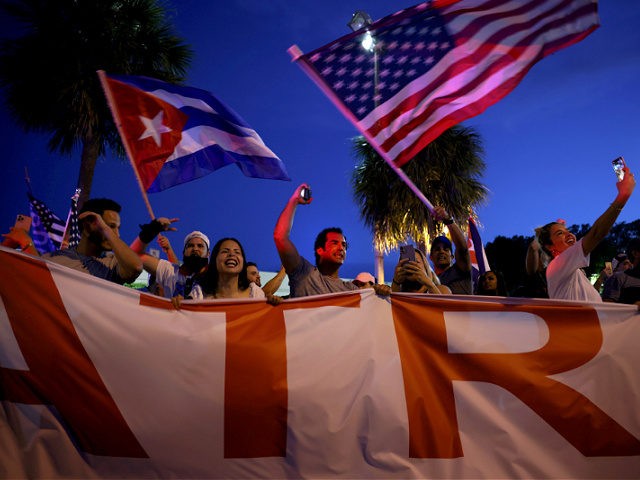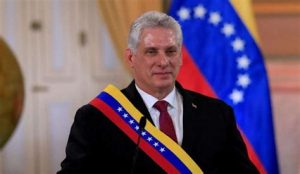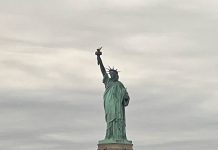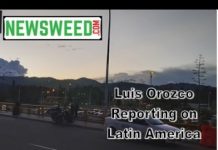Much has been said about the future of the American flag, as voices in some quarters call for it to be replaced by a symbol more “inclusive” and less “divisive.” And yet, less than 500 miles from the peninsula of Florida, Cubans gather in the streets, waving the American flag in solidarity as they protest their government over lack of freedoms and a crumbling economy “aggravated by the Covid-19 pandemic and US sanctions.” As stated by NBC News, “Health authorities reported almost 7,000 new cases and 47 deaths — a record for infections and deaths on the Caribbean island of just over 11 million people.” By all accounts, Cuba is on the edge of revolt and chaos.
Cuba: A History of Repression
In typical Cuban fashion predicated on decades of oppression by Fidel Castro and his regime, demonstrators were “forcibly arrested and thrown into the back of vans by police officers.” This response is part and parcel of Cuba’s legacy, born from the violence and oppression of the Cuban revolution that was packaged in the romantic and poetic garb of Che Gueverra and soft-pedaled to Cubans and the West as a dreamy version of Marxist ideology promising the fruit of “Homeland or Death, we shall overcome!”

Nearly 70 years later, the fruit is rotten, and Cubans refuse to eat it anymore. And although the Biden administration likes to characterize the protest as a response to Cuba’s handling of COVID-19, the reality is deeper and darker. As reported by BBC News, “A young man who only gave his name as Carlos Alberto told BBC News Mundo he was hiding at his girlfriend’s home after taking part in a demonstration. ‘A colleague of mine was arrested, they came to look for him at his home. I’m afraid the same thing could happen to me.We weren’t doing anything bad, we’re just asking for freedom and with this attitude they’re showing what they are: a dictatorship.’”
And Cuba has no issue with upgrading its control of the populace by using technology as a repressive measure. The following comment from NPR’s Carrie Kahn paints a grim picture:
It’s really tough because the internet is totally controlled by the regime, and it appears that it has either been cut or is very limited today. There’s still videos being posted to social media, but it’s unclear whether those were from today or yesterday. It’s just hard to verify when and where they were shot. I reached out to a lot of my contacts on the island, and I can’t get through either on social media apps or even on phone lines. I just get busy signals or phone calls just don’t go through.
Cuba: A Totalitarian State in Action
In reality, this oppressive dynamic of arresting and jailing dissidents is old hat for Cuban authorities. Wielding the Marxist concept of “new man,” Ernesto Che Guevara and the Castro government imprisoned anyone who stood in opposition to its ideological ends. Jaime Suchlicki, Director at the Cuban Studies Institute and Cuban history scholar, wrote that Castro was serving “. . . notice to his own supporters and to the population at large that he would not tolerate any dissent and that Cuba was entering a period of ideological orthodoxy guided by the Communist party.” The Cuban government even put aside its disdain for Nazi ideology and adapted the motto at Auschwitz, “Work sets you free,” changing it to “Work will make you men.”
But work is hard to come by in Cuba, ironically. Although Cuba uses state-run employment schemes, with approximately 70% of workers employed by the Cuban government, and a variety of redistributive welfare programs to ameliorate conditions, Cubans are mired in a low-growth, low-wage economy that is running counter to the world-wide trend of poverty reduction precipitated by free-trade markets. A publication by The World Bank states:
A dramatic increase in developing country participation in trade has coincided with an equally sharp decline in extreme poverty worldwide. Developing countries now constitute 48 percent of world trade, up from 33 percent in 2000, and the number of people living in extreme poverty has been cut in half since 1990, to just under one billion people. Trade has helped increase the number and quality of jobs in developing countries, stimulated economic growth, and driven productivity increases.
Meanwhile, once you tear off the concealing layers of government-manipulated data, Cuba is exposed for running the opposite direction of this trend. Writing for Diario De Cuba, author Roberto Álvarez Quinones argues “A scourge that aggravates poverty in Cuba is unemployment. The regime’s statistics are always disingenuous, but when it comes to unemployment, they are downright outrageous.”
Quinones points out the dire circumstances of the retired and homeless of Cuba: “A dramatic aspect [of] poverty in the country is that of its retired and homeless. With pensions equivalent to 12 dollars a month on average, more and more people live in absolute penury. Almost ragged, gaunt from hunger, they sell anything they can on the streets, rummage in garbage cans, and beg.”
In an in-depth analysis authored by Ernesto Hernandez-Catá of the Association for the Study of the Cuban Economy, Hernandez-Catá found that, “Low productivity has been identified as one of the major reasons for Cuba’s poor economic performance and its low per-capita income. Several factors account for this performance, including very low investment and the basic inefficiency of an economic system that is largely run by the state, stifles entrepreneurship and distorts resource allocation by controlling prices.”
And the current protests comport with Quinones’ and Hernandez-Catá perspectives. The Wall Street Journal reports that “Cuban citizens have taken to the streets across the country for the first time in more than six decades to protest against deteriorating living conditions and the lack of basic goods and services, including medical attention amid increasing numbers of coronavirus infections.”
In addition to economic impoverishment, Cuban workers find their civil rights imperiled on a daily basis. Amnesty International reports:
Those who even delicately disapprove of the Cuban government’s policies are either arbitrarily dismissed from their jobs or harassed by the state until they feel they have no option but to resign or leave the country. Once dismissed from state employment for expressing a critical view, it is nearly impossible for people to find other state employment.” As Erika Guevara-Rosas, Americas Director at Amnesty International, frames it, ““The failure of the authorities to respect people’s human rights has had an impact far beyond those directly targeted for their activism and seeps into the everyday experiences and hopes of people from all walks of life.
Freedom House, an organization “founded on the core conviction that freedom flourishes in democratic nations where governments are accountable to their people,” has this to say about El Caimán:
Cuba’s one-party communist state outlaws political pluralism, bans independent media, suppresses dissent, and severely restricts basic civil liberties. The government continues to dominate the economy despite recent reforms that permit some private-sector activity. The regime’s undemocratic character has not changed despite a generational transition in political leadership between 2018 and 2019 that included the introduction of a new constitution.
Unfortunately, Cuba’s government is participating in active denial of the circumstances. In keeping with previous efforts to pin Cuban problems on the United States, specifically in connection to our economic embargo policies, Cuban President Miguel Díaz-Canel impugned the protests as a political concoction of the West, saying “The protests involve many revolutionary citizens who want an explanation for the current situation in the country, but are also contaminated by groups of opportunists who take advantage of the current crisis to undermine order and generate chaos.”
During a press conference that was broadcast live on Cuban TV and live-streamed on YouTube on Monday, Díaz-Canel conjured the ghosts of Marx and Lenin, stating, “All this discontent, these feelings of dissatisfaction, what is the ultimate cause of all that? It’s the blockade. This is part of the U.S. playbook to destabilize us, to generate chaos, to break our will and spirit.”

Whether the U.S. embargo is to blame for Cuba’s current circumstances is debatable. As White House press secretary Jens Psaki said, “. . . the U.S. embargo allows humanitarian goods to reach Cuba. We exidite [sic] — expedite any request to export humanitarian or med- — medical supplies to Cuba. That continues to be the case. And the United States regularly authorizes the export of agricultural products, medicine, medical equipment, and humanitarian goods to Cuba — and, since 1992, has authorized the export of billions of dollars of those goods to Cuba. So that’s simply inaccurate in terms of the facts that are stated.”
Furthermore, consider the fact that the Cuban government that owns the means of production and distribution of all goods, and this supreme power is used to control the populace, stifle dissension, and suppress the free market. As Freedom House puts it, “Cubans employed by foreign firms are often much better remunerated than their fellow citizens, even though most are contracted through a state employment agency that siphons off the bulk of their wages and uses political criteria in screening applicants.”
At the end of the day, Cuba’s demise is the making of its own government, a totalitarian regime that uses its police state to coerce its citizens into subservience and its media apparatus to control both the flow and messages about the deteriorating conditions in the country.
As Cubans assert their rights to be part of the world democratic fabric, the words of the famed author and political activist Aleksandr Solzhenitsyn ring with truth and import: “Communism will never be halted by negotiations or through the machinations of detente. It can only be halted by force from without or by disintegration from within.”






